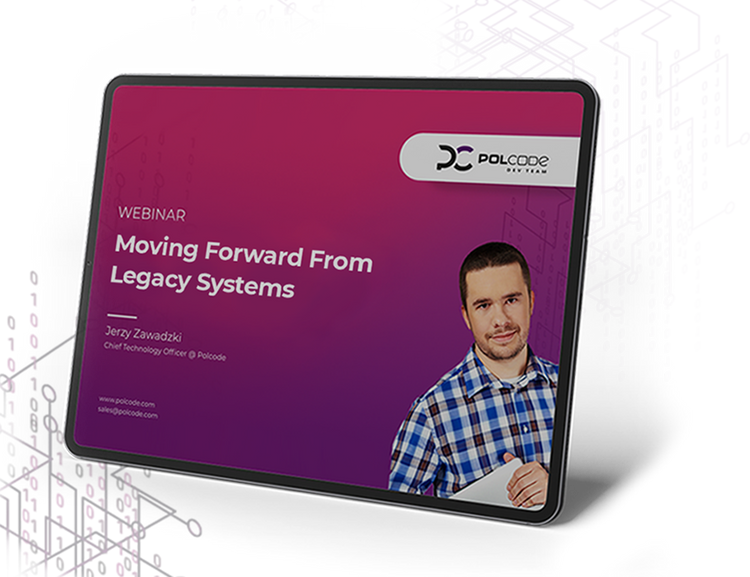
With 82,2% of websites built with it, PHP reigns in server-side web development. No wonder. PHP is versatile and can be combined with many database solutions. Still, only 6,6% of businesses enjoy its 7th release, which among other tweaks boasts 100% improvement in performance. Check out what else you miss out on.

PHP 7—Is Your Business Up to Date?
With 82,2% of websites built with it, PHP reigns in server-side web development. No wonder. PHP is versatile and can be combined with many database solutions. Still, only 6,6% of businesses enjoy its 7th release, which among other tweaks boasts 100% improvement in performance. Check out what else you miss out on.
Cutting Down on Power Consumption
PHP 7 uses fewer server resources than its earlier versions, which equals less energy consumption and lower energy costs generated by hardware powering PHP 7 web apps.
With lower power consumption comes also one more benefit—less CO2 emission. Even though much can be said about the actual influence of human activity on the climate change, generating less CO2 is always a step forward.

Higher Usage Comfort for More Customers
If apps running on PHP 7 demand fewer hardware resources, the same hardware is able to serve more users at the same. In the resource-demanding world of eCommerce, it means more customers can shop experiencing the same performance.
Fortifying Your Online Venture
When you run an online business, you know site performance can often make or break a deal. If your customers wait for more than five seconds for your site to load, they’re gone for good. Sites upgraded to PHP 7 notice a considerable increase in website performance.

Interactive Websites Providing Fast Response
With all that speed aboard, PHP 7 allows devs to introduce more interactive features into the PHP-based websites without losing on performance. More interaction means more user engagement which can lead to more sales and improved customer experience.
“The introduction of PHP 7 was the best thing that happened to PHP world since Composer. About 30% shorter request time and almost 50% less memory consumption (based on our clients’ sites results),” says Jerzy Zawadzki, Polcode’s CTO.
Speeding Up WordPress Sites
PHP 7 is also good news for sites running on WordPress. The 7th release of PHP improved WP’s speed by 2 to 3 times. Considering that as many as 28,8% of all websites across the globe use WordPress, PHP 7 is a major, must-have upgrade to the popular content management system. Even more so since WordPress has been known for its issues with lower performance in the past.
“The slower the framework, the more noticable performance gain. WordPress is a good example of why PHP 7 is a ‘must have’ for web developing these days,” says Michał Krawczyk, Senior WordPress Developer at Polcode.
What to Consider Before Making an Upgrade?
PHP 7 packs a whole trunk of benefits that your online asset should haul right back home and enjoy. Since PHP 7 is constantly evolving, it’s a matter of time before all PHP-built web apps upgrade to PHP 7.
The only reason why you should think twice about an upgrade is if libraries and other plugins of your web app are not yet PHP 7-compatible. If this is the case, you can either wait or seek other libraries and plugins which are already compatible.
To check if your WordPress site is PHP 7-ready use PHP Compatibility Checker.
To check if your website code is PHP 7-compatible use PHPCompatibility.
Upgrading to PHP 7
NOTE: Do a backup of your website before making any such fundamental changes.

You can upgrade your website to PHP 7 directly in your hosting admin panel (ask customer service to check if your hosting already supports the 7th release). If your hosting company doesn’t yet support PHP 7, it might be high time to find another hosting provider that does.
Now, with PHP 5.5 and up, there shouldn’t be any problems with an upgrade. But if you’re running an older version of PHP, say 5, there could be black clouds ahead of your road to PHP 7.
Remember, if you decide to make an upgrade without checking if your website code is compatible with PHP 7, you risk stalling your business operations for the time required to fix the website.
If you’re unsure how to go about your PHP 7 upgrade or you are afraid the upgrade will negatively affect your business, contact us. Our devs will perform a smooth and effortless upgrade of your website.
Key Takeaways
- Improved performance
- Less memory consumption
- Three times more requests per second
- Heavy traffic resilient
- Environment-friendly
On-demand webinar: Moving Forward From Legacy Systems
We’ll walk you through how to think about an upgrade, refactor, or migration project to your codebase. By the end of this webinar, you’ll have a step-by-step plan to move away from the legacy system.

Latest blog posts
Is Your E-commerce Business Ready for the European Accessibility Act?
Jun 16, 2025 by Janusz Toczko
Legacy Software and Security Risks: Why Regular Audits Are Your Best Defense
Jun 4, 2025 by Jerzy Zawadzki
Magento Enters the SaaS Arena: What Adobe Commerce as a Service Means for Your Business
Apr 24, 2025 by Jerzy Zawadzki
Ready to talk about your project?
Tell us more
Fill out a quick form describing your needs. You can always add details later on and we’ll reply within a day!
Strategic Planning
We go through recommended tools, technologies and frameworks that best fit the challenges you face.
Workshop Kickoff
Once we arrange the formalities, you can meet your Polcode team members and we’ll begin developing your next project.

